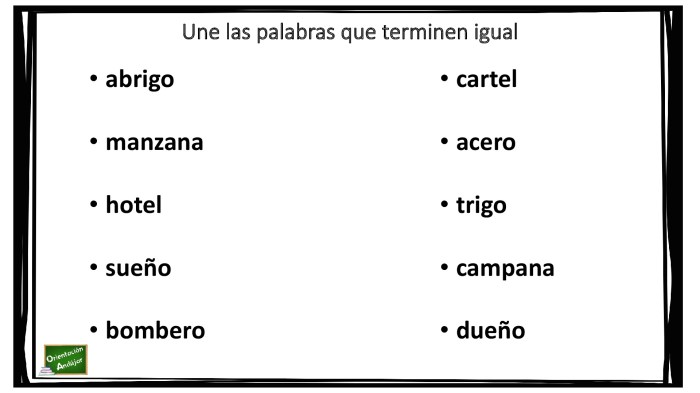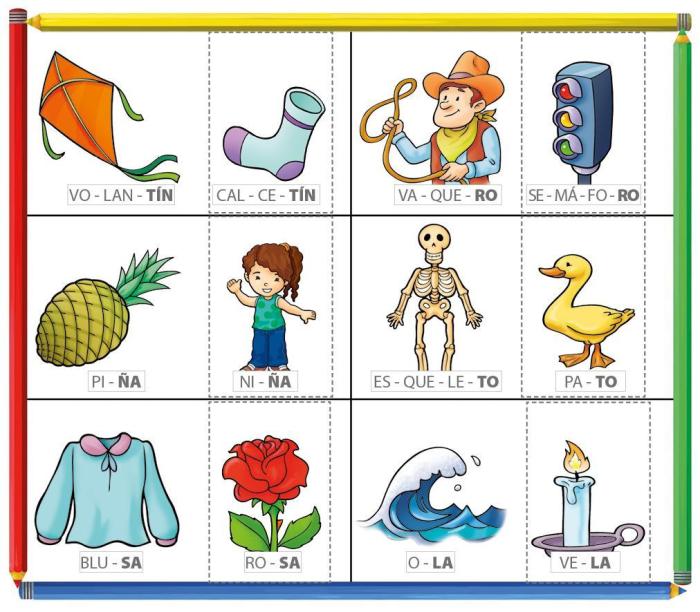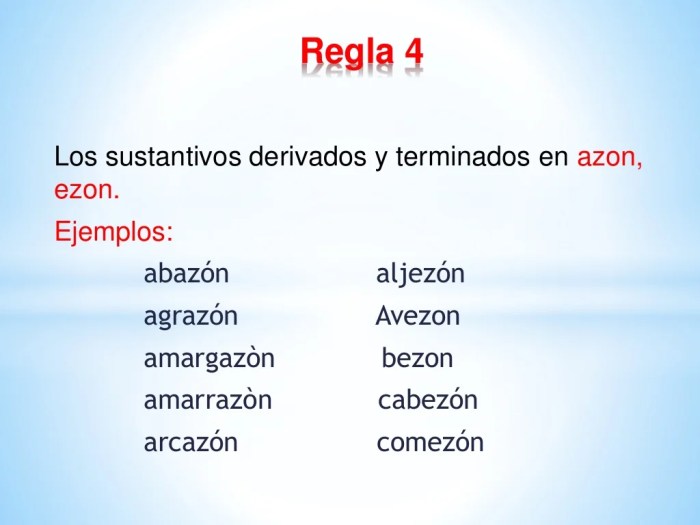Palabras que terminan en zón – ¡Sumérgete en el fascinante mundo de las palabras que terminan en “-zón”! Este viaje lingüístico te llevará a través de la historia, el significado y el uso de estas peculiares palabras en español.
Desde sus orígenes etimológicos hasta sus connotaciones semánticas, descubriremos la riqueza y diversidad de este sufijo.
General Overview of Words Ending in “-zón”
In Spanish, words ending in “-zón” are a type of noun that is typically used to describe a person or thing that possesses a specific characteristic or quality to a significant degree. These words often have a negative or derogatory connotation, implying that the person or thing is excessive or extreme in their behavior or nature.
Grammatically, words ending in “-zón” are masculine nouns and are often used in a pejorative sense. They can be used as subjects, objects, or complements in a sentence, and can be modified by adjectives or adverbs to further emphasize the negative or excessive nature of the characteristic being described.
Usage in Different Contexts
Words ending in “-zón” can be used in a variety of contexts, including:
- To describe a person who has a particular personality trait or characteristic, such as “mentiroso” (liar), “egoísta” (selfish), or “glotón” (glutton).
- To describe a thing that is excessive or extreme in its size, quantity, or quality, such as “gigantón” (giant), “camarón” (large shrimp), or “carretón” (large cart).
- To describe a situation or event that is particularly chaotic or difficult, such as “revolución” (revolution), “confusión” (confusion), or “destrucción” (destruction).
Etymology and Historical Evolution
Words ending in “-zón” in Spanish trace their origins to various linguistic influences, primarily from Latin and Arabic.
Latin played a significant role in the development of Spanish vocabulary, and many words ending in “-zón” can be traced back to Latin nouns and adjectives that had similar endings, such as “-sionem” or “-tionem”. These Latin terms often denoted a state, quality, or condition.
Arabic Influence
Arabic also contributed to the development of words ending in “-zón” in Spanish. Many Arabic words were introduced into Spanish during the period of Islamic rule in the Iberian Peninsula. These words often had the suffix “-zūn”, which indicated a person who possessed a particular quality or characteristic.
Semantic Analysis of “-zón” Suffix

The “-zón” suffix in Spanish conveys a specific semantic meaning and carries certain connotations. It is commonly associated with the following:
Words that use the “-zón” suffix often share common themes and patterns. These include:
Augmentation and Intensity
The suffix “-zón” frequently denotes an increase in size, quantity, or intensity. For example, “grandote” (large), “pesadote” (heavy), and “saladozón” (salty).
Diminution and Affection
In some cases, the “-zón” suffix can also convey a sense of diminution or affection. For example, “chiquitín” (little), “pobrecito” (poor thing), and “viejecito” (old man).
Pejorative and Derogatory
The “-zón” suffix can sometimes have a pejorative or derogatory connotation. For example, “ladronzuelo” (thief), “embriagón” (drunkard), and “holgazán” (lazybones).
Regional and Colloquial
The use of the “-zón” suffix is often regional or colloquial, adding a touch of informality or local flavor to the language.
Categorization of Words Ending in “-zón”
Words ending in “-zón” exhibit a wide range of semantic fields, encompassing diverse concepts and meanings. To facilitate comprehension, we categorize these words based on their shared semantic characteristics.
Augmentative Nouns
This category comprises words that denote an exaggerated or enlarged version of the concept represented by the base word. Examples include:
- bocón(big mouth)
- narizón(big nose)
- orejón(big ears)
Nouns Indicating a Physical Feature
Words in this category describe a distinctive physical characteristic or trait. Examples include:
- barrigón(big belly)
- calvón(bald)
- gordinflón(chubby)
Nouns Indicating a Habit or Tendency
This category includes words that refer to a habitual or characteristic behavior or tendency. Examples include:
- borrachín(drunkard)
- dormilón(sleepyhead)
- llorón(crybaby)
Nouns Indicating a Profession or Occupation
Words in this category denote a specific profession or occupation. Examples include:
- cantón(singer)
- herrerón(blacksmith)
- pescón(fisherman)
Syntactic and Morphological Properties

Words ending in “-zón” exhibit distinct syntactic and morphological characteristics. They are typically masculine in gender and form their plural by adding “-es” (e.g., “corazón” (heart)”corazones” (hearts)). They function as nouns and can occur in various grammatical roles, including subject, object, and complement.
Grammatical Behavior, Palabras que terminan en zón
- Gender:Words ending in “-zón” are predominantly masculine, except for a few exceptions like “razón” (reason), which is feminine.
- Number:They form their plural by adding “-es” (e.g., “pezón” (nipple) – “pezones” (nipples)).
- Case:In Spanish, nouns have a grammatical case system. Words ending in “-zón” follow the regular case system, taking the appropriate article or prepositional form based on their grammatical function.
Pragmatic and Stylistic Considerations

Words ending in “-zón” possess distinctive pragmatic and stylistic implications that influence their usage and interpretation in various contexts. Their impact on tone, register, and audience reception is crucial to consider when employing these words effectively.
The “-zón” suffix often imparts a sense of exaggeration, intensity, or emphasis to the modified noun. For instance, “corazón” (heart) becomes “corazón” (big heart), conveying a heightened emotional state. This augmentative effect can create a vivid or dramatic impression, drawing attention to the specific quality or characteristic being described.
Tone and Register
Words ending in “-zón” typically carry an informal or colloquial tone, suitable for casual conversations, storytelling, or literary works seeking to evoke a familiar or down-to-earth atmosphere. They are less common in formal or academic settings, where a more objective and precise language is preferred.
Audience Reception
The use of words ending in “-zón” can elicit different reactions from audiences. Some may appreciate the expressive and engaging nature of these words, while others may perceive them as excessive or even vulgar. The context and intended audience should be carefully considered to ensure that the “-zón” suffix aligns with the desired tone and message.
Cultural and Regional Variations

Words ending in “-zón” exhibit cultural and regional variations in their usage. In certain geographical areas, these words are more prevalent, while in others, they may be less common.
Geographical Distribution
The use of words ending in “-zón” is particularly prevalent in certain regions of Spain, such as Andalusia and Murcia. In these areas, these words are often used to express concepts related to size, abundance, or intensity. For example, the word “grandazón” (grandson) is commonly used in Andalusia to refer to a large or impressive grandson.In
other regions of Spain, such as Catalonia and the Basque Country, words ending in “-zón” are less frequently used. Instead, these regions may prefer to use alternative suffixes, such as “-ote” or “-azo,” to convey similar meanings. For instance, the word “grandote” (big or impressive) is often used in Catalonia to refer to a large or impressive grandson.
Linguistic and Cultural Factors
The distribution of words ending in “-zón” is influenced by a combination of linguistic and cultural factors. In areas where these words are more prevalent, there may be a linguistic tendency to use the “-zón” suffix to express certain concepts.
Additionally, cultural factors, such as regional traditions and dialects, can also contribute to the popularity of these words in specific regions.
Comparison to Other Spanish Suffixes
Words ending in “-zón” share certain semantic concepts with other Spanish suffixes, such as “-ón”, “-azo”, and “-ote”. These suffixes all convey a sense of exaggeration, emphasis, or augmentation.
However, there are subtle differences in their usage and meaning. “-zón” typically denotes a large or prominent physical characteristic or quality, while “-ón” is more general and can be used to describe both physical and non-physical attributes. “-azo” and “-ote” are often used to express a strong or extreme emotion or sensation.
Grammatical Behavior, Palabras que terminan en zón
In terms of grammatical behavior, words ending in “-zón” are typically masculine nouns or adjectives. They can also be used as adverbs to indicate a large degree or extent.
Palabras que terminan en “zón” suenan a un ritmo peculiar, como “zón”, “zón”, “zón”. En el caso de “mala v. crown bay marina”, un pleito legal sobre un accidente de bote , la palabra “zón” aparece en el nombre de la marina involucrada.
Volviendo a las palabras que terminan en “zón”, su sonido único las hace destacar en cualquier contexto.
“-ón” and “-azo” can also be used as nouns or adjectives, but they can also be used as augmentatives to form larger or more emphatic versions of existing words.
“-ote” is primarily used as an augmentative and is less common than the other suffixes.
Creative Applications and Examples: Palabras Que Terminan En Zón
Words ending in “-zón” offer a fertile ground for creative expression, allowing writers and artists to tap into their expressive potential. Their ability to evoke emotions, paint vivid imagery, and convey specific tones makes them a valuable tool in various literary and artistic contexts.
One striking characteristic of these words is their ability to create a sense of grandeur and epic proportions. Take, for instance, the word “horizontón,” which conjures up an image of a vast, boundless horizon stretching far beyond the limits of human perception.
Similarly, “corazón” carries the weight of profound emotions, evoking the depth and complexity of the human heart.
Figurative Language
Writers often employ words ending in “-zón” to create vivid metaphors and similes. For example, the phrase “boca de dragón” (dragon’s mouth) is a powerful metaphor used to describe something that is both alluring and dangerous, while “fuerte como un león” (strong as a lion) is a simile that conveys immense strength and courage.
Personification
These words can also be used to personify inanimate objects, giving them human-like qualities. In the poem “El mar,” Pablo Neruda writes, “El mar se enfurece, ruge y azota” (The sea rages, roars, and lashes out), imbuing the sea with the emotions and actions of a living being.
Tone and Atmosphere
The choice of words ending in “-zón” can significantly influence the tone and atmosphere of a literary work. For example, the use of “gigantón” (giant) in a horror story creates a sense of awe and fear, while “viejecita” (little old woman) in a fairy tale evokes a sense of warmth and nostalgia.
Pedagogical Implications
Teaching words ending in “-zón” offers valuable pedagogical opportunities in Spanish language learning.By introducing these words early on, learners can develop a solid foundation in their usage and expand their vocabulary. Effective strategies include using engaging activities like games, role-playing, and storytelling that immerse learners in the context where these words are commonly used.
Reinforcing Usage
Reinforcing the usage of words ending in “-zón” is crucial for learners to master their application. This can be achieved through regular practice exercises, such as fill-in-the-blank sentences, translation tasks, and creative writing assignments that encourage learners to use these words in various contexts.
Additionally, providing learners with authentic materials, such as articles, songs, and videos, exposes them to the natural use of these words, reinforcing their understanding and usage.
Questions and Answers
¿Qué son las palabras que terminan en “-zón”?
Son palabras en español que comparten el sufijo “-zón”, el cual modifica su significado y función gramatical.
¿Cuál es el origen de este sufijo?
Tiene raíces latinas y se remonta al sufijo “-ōnem”, que denotaba tamaño o abundancia.
¿Cómo se utilizan estas palabras?
Suelen emplearse para indicar tamaño, intensidad, cualidades o estados.